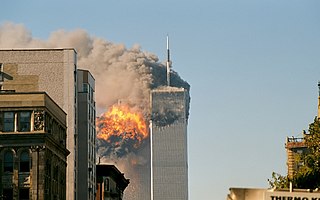Honor suicide can mean:
- Honor suicide, a form of suicide motivated by personal honor
- Forced suicide, a form of honor killing in which the victim is pressured into dying by suicide
Honor suicide can mean:

Suicide was an American musical duo composed of vocalist Alan Vega and instrumentalist Martin Rev, intermittently active between 1970 and 2016. The group's pioneering music used minimalist electronic instrumentation, including synthesizers and primitive drum machines, and their early performances were confrontational and often ended in violence. They were among the first acts to use the phrase "punk music" in an advertisement for a concert in 1970—during their very brief stint as a three-piece including Paul Liebegott.

Mariel Hemingway is an American actress. She began acting at age 14 with a Golden Globe-nominated breakout role in Lipstick (1976), and she received Academy and BAFTA Award nominations for her performance in Woody Allen's Manhattan (1979).

The Suicide Commandos are an American punk rock trio from Minneapolis. They formed in 1975 and released two 7-inch EPs on an indie label in 1976 and 1977 before signing with Blank Records in 1977 and releasing one album, Make a Record. Despite their short original 4-year stint together, the Suicide Commandos are considered the pioneers for jump-starting a punk rock music scene in the Twin Cities, which eventually produced bands like The Suburbs, Hüsker Dü, The Replacements and Soul Asylum.
A crisis hotline is a phone number people can call to get immediate emergency telephone counseling, usually by trained volunteers. The first such service was founded in England in 1951 and such hotlines have existed in most major cities of the English speaking world at least since the mid-1970s. Initially set up to help those contemplating suicide, many have expanded their mandate to deal more generally with emotional crises. Similar hotlines operate to help people in other circumstances, including rape, bullying, self-harm, runaway children, human trafficking, and people who identify as LGBT or intersex. Despite crisis hotlines being common, their effectiveness in reducing suicides is not clear.
A suicide method is any means by which a person may choose to end their life. Suicide attempts do not always result in death, and a non-fatal suicide attempt can leave the person with serious physical injuries, long-term health problems, or brain damage.

Goujian was the king of the Kingdom of Yue near the end of the Spring and Autumn period (春秋). He was the son of Marquis Yunchang.
A murder–suicide is an act where an individual intentionally kills one or more people before killing themselves. The combination of murder and suicide can take various forms:

There are a variety of religious views on suicide.

The Trevor Project is an American nonprofit organization founded in 1998. Focused on suicide prevention efforts among lesbian, gay, bisexual, transgender, queer, and questioning (LGBTQ) youth, they offer a toll-free telephone number where confidential assistance is provided by trained counselors. The stated goals of the project are to provide crisis intervention and suicide prevention services for youth, as well as to offer guidance and resources to parents and educators in order to foster safe, accepting, and inclusive environments for all youth, at home, schools and colleges.

Death is dealt with differently in cultures around the world, and there are ethical issues relating to death, such as martyrdom, suicide and euthanasia. Death refers to the permanent termination of life-sustaining processes in an organism, i.e. when all biological systems of a human being cease to operate. Death and its spiritual ramifications are debated in every manner all over the world. Most civilizations dispose of their dead with rituals developed through spiritual traditions.
An honor killing, honour killing, or shame killing is a traditional form of murder in which a person is killed by or at the behest of members of their family or their partner, due to culturally sanctioned beliefs that such homicides are necessary as retribution for the perceived dishonoring of the family by the victim. Honor killings are often connected to religion, caste, other forms of hierarchical social stratification, or sexuality. Most often, it involves the murder of a woman or girl by male family members, due to the perpetrators' belief that the victim has lost her innocence by bringing dishonor or shame upon the family name, reputation or prestige. Honor killings are believed to have originated from tribal customs.
In Japan, suicide is considered a major social issue. In 2017, the country had the seventh highest suicide rate in the OECD, at 14.9 per 100,000 persons, and in 2019 the country had the second highest suicide rate among the G7 developed nations.

A suicide attack is a deliberate attack in which the perpetrators knowingly sacrifice their own lives as part of the attack. These attacks are often associated with terrorism or military conflicts and are considered a form of murder–suicide. Suicide attacks involving explosives are commonly referred to as suicide bombings. In the context of terrorism, they are also commonly referred to as suicide terrorism. While generally not inherently regulated under international law, suicide attacks in their execution often violate international laws of war, such as prohibitions against perfidy and targeting civilians.
Honor suicide is a type of suicide whereby a person kills themself to escape the shame of an immoral or dishonorable action, such as having had extra-marital sexual affairs, partaking in a scandal, or suffering defeat in battle. It is distinguished from regular suicide in that the subject is actively deciding to either privately or publicly kill themself for the sake of restoring or protecting honor. Some honor suicides are a matter of personal choice and are devoid of any cultural context. For example, honor suicides have been committed by military figures when faced with defeat, such as Adolf Hitler, Mark Antony, Władysław Raginis, Yoshitsugu Saito, Jozef Gabčík, Hans Langsdorff, and Emperor Theodore of Ethiopia.
There has always been much debate over the 'Christian views on suicide', with early Christians believing that suicide is sinful and an act of blasphemy. Modern Christians do not consider suicide an unforgivable sin or something that prevents a believer who died by suicide from achieving eternal life.

Seppuku, also called harakiri, is a form of Japanese ritualistic suicide by disembowelment. It was originally reserved for samurai in their code of honour, but was also practised by other Japanese people during the Shōwa era to restore honour for themselves or for their families.
Altruistic suicide is the sacrifice of one's life in order to save or benefit others, for the good of the group, or to preserve the traditions and honor of a society. It is always intentional. Benevolent suicide refers to the self-sacrifice of one's own life for the sake of the greater good. Such a sacrifice may be performed for the sake of executing a particular action, or for the sake of keeping a natural balance in the society.

Tyler Clementi was an American student at Rutgers University–New Brunswick who jumped to his death from the George Washington Bridge over the Hudson River on September 22, 2010, at the age of 18. On September 19, 2010, without Clementi's knowledge, his roommate, Dharun Ravi, used a webcam on his dorm room computer and his hallmate Molly Wei's computer to view Clementi kissing another man. Clementi found out after Ravi posted about the webcam incident on Twitter. Two days later, Ravi urged friends and Twitter followers to watch a second encounter between Clementi and his companion, though the viewing never occurred.

Leelah Alcorn was an American transgender girl whose suicide attracted international attention; she had posted a suicide note to her Tumblr blog about societal standards affecting transgender people and expressing the hope that her death would create a dialogue about discrimination, abuse, and lack of support for transgender people.
The "Momo Challenge" was a hoax and an internet urban legend that was rumoured to spread through social media and other outlets. It was reported that children and adolescents were being harassed by a user named Momo to perform a series of dangerous tasks including violent attacks, self-harm, harming others, and suicide. Despite claims that the phenomenon had reached worldwide proportions in July 2018, the number of actual complaints was relatively small and many law enforcement agencies have not been able to confirm that anyone was harmed as a direct result of it. Moreover, the Momo Challenge sparked global panic and prompted urgent warnings from authorities and child safety advocates. Reports of children encountering Momo's disturbing messages circulated widely, causing heightened fears among parents and caregivers.